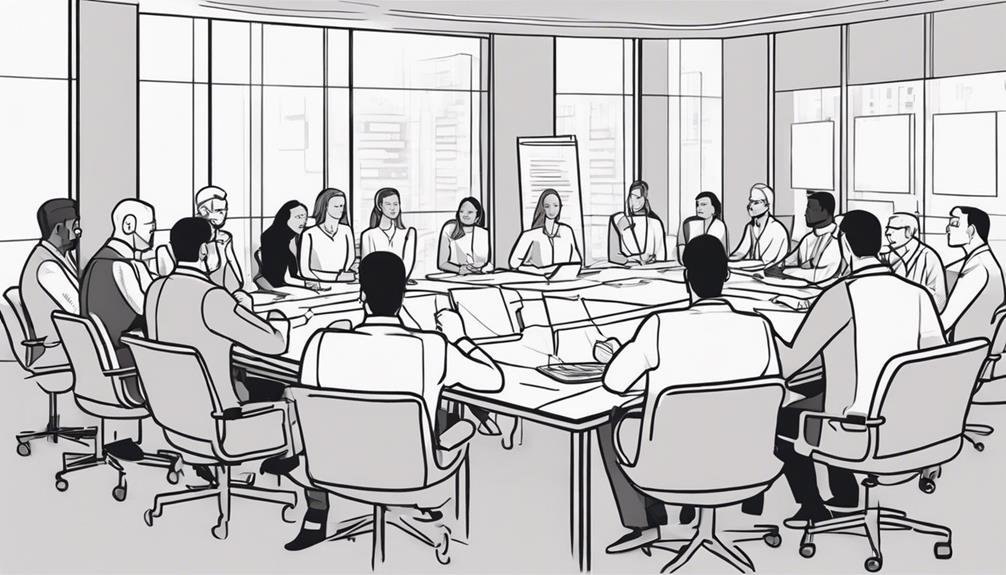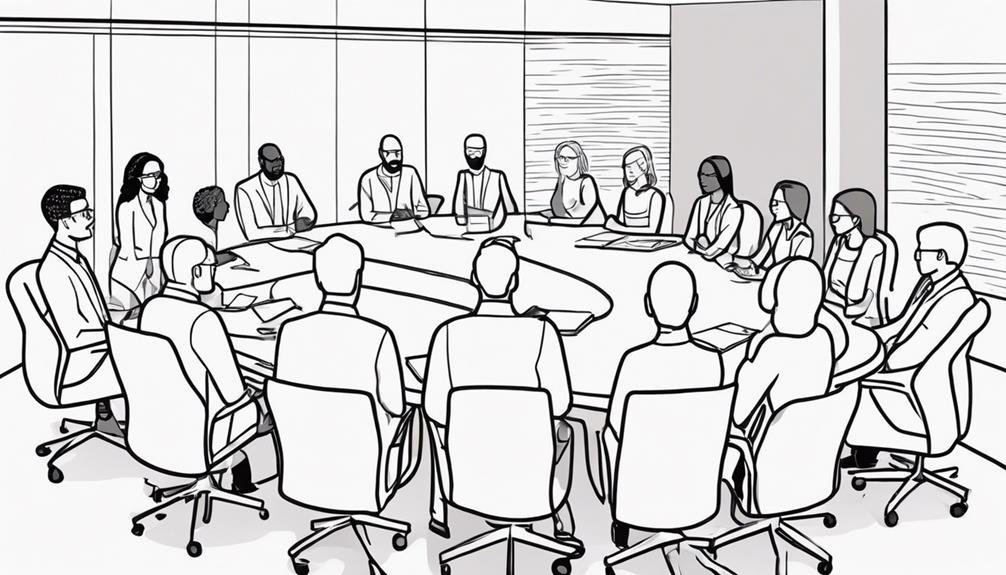Master essential skills for workplace success by honing communication abilities with clear, concise messages and engaging interactions. Develop leadership qualities to empower teams, foster collaboration, and create a positive work environment. Enhance teamwork proficiency by mastering communication and interpersonal skills, leading to career advancement and positive outcomes. Sharpen problem-solving abilities through critical thinking and adaptability, setting yourself apart in the job market. Cultivate adaptability and flexibility to thrive in fast-paced industries. Valued interpersonal skills contribute to team cohesion and job success. Prioritize professionalism, digital technology proficiency, organizational abilities, and continuous learning to excel in the professional domain.
Key Takeaways
- Communication skills are vital for workplace success, both verbal and written.
- Effective leadership fosters team development and creates a positive work environment.
- Teamwork proficiency is essential for career advancement and a productive work environment.
- Problem-solving skills showcase adaptability and innovation in the workplace.
- Adaptability, flexibility, and continuous learning are crucial for thriving in fast-paced industries.
Communication Skills

Communication skills are vital in the workplace. Verbal and written communication skills are necessary for success. Only 41.6% of employees demonstrate proficiency in these skills, yet 95.9% of employers consider them essential. To excel, over-communicate with short, clear messages to guarantee understanding. Engage your audience in conversations to enhance effectiveness. Being a good listener is key; it allows you to provide thoughtful responses and fosters better comprehension. Actively listening shows respect and interest in what others have to say, promoting a positive work environment. By honing these skills, you can build stronger relationships, avoid misunderstandings, and increase productivity. Remember, communication is a two-way street. Encourage open dialogue, ask questions, and seek feedback. Your ability to communicate effectively will set you apart in the workplace and help you achieve your goals.
Leadership Abilities
When it comes to excelling in the workplace, honing your leadership abilities is key. From inspiring team motivation to mastering effective delegation strategies, these skills are essential for fostering a productive work environment. Encouraging professional growth not only benefits your team members but also contributes to the overall success of your organization.
Inspiring Team Motivation
Leadership abilities play a pivotal role in fostering team motivation and driving success within any workplace setting. Effective leaders understand the importance of utilizing their leadership skills to inspire and motivate their teams. By prioritizing team development, fostering collaboration, and encouraging innovation, strong leaders create a positive work environment where employees feel motivated and engaged. Effective communication is a key aspect of leadership skills that helps in conveying goals, providing feedback, and ensuring clarity within the team.
Leaders who possess these qualities can lead their teams to higher levels of engagement, productivity, and overall success. A motivated team is more likely to achieve their goals, overcome challenges, and excel in their roles. Leadership qualities such as communication, empathy, and decision-making are essential for motivating and guiding teams effectively. By embodying these traits, leaders can create a supportive and inspiring workplace culture that fosters team motivation and drives success.
Effective Delegation Strategies
To build upon the foundation of inspiring team motivation, effective delegation strategies serve as a critical component of successful leadership abilities in the workplace. Delegating tasks effectively not only increases productivity by up to 25% but also leads to team members who are 33% more engaged. Proper delegation is key, as it can result in a 70% increase in job satisfaction among employees. By delegating tasks appropriately, leaders can free up to 20% of their time for strategic planning and development, enhancing overall team performance and efficiency. Studies show that effective delegation is linked to a 15% increase in team performance and efficiency. To harness the full potential of your team and maximize productivity, it is essential to master the art of delegating tasks effectively. Remember, proper delegation not only benefits your team but also allows you to focus on strategic initiatives that drive success.
Encouraging Professional Growth
Enhancing your professional growth through the development of leadership abilities is necessary for success in today's competitive work environment. Leadership abilities play an important role, with statistics showing that 77% of graduates exhibit proficient teamwork skills, highlighting the significance of these skills in the workplace. To enhance your leadership skills, it is crucial to evaluate your strengths and weaknesses, work on improving communication, and practice critical thinking.
Furthermore, developing adaptability and flexibility through mentorship, networking, and continuing education can greatly boost your leadership potential. Employers value qualities such as motivating and organizing effectively, prioritizing tasks, and demonstrating empathy. By focusing on these areas, you can further enhance your leadership abilities and stand out in the workplace.
Teamwork Proficiency

With teamwork being a cornerstone of success in today's workforce, possessing proficiency in collaborative efforts is paramount for career advancement. Teamwork skills, communication, and interpersonal skills are essential components in fostering a positive and productive work environment. Studies show that 77% of graduates exhibit proficiency in teamwork, highlighting its significance in job success. By enhancing productivity and fostering synergy among team members, teamwork opens doors to new learning opportunities and positive outcomes. Engaging in cooperative opportunities, participating in class activities, and gaining real-world experience are effective ways to develop teamwork and collaboration skills. Employers across various industries highly value teamwork proficiency, recognizing its role in driving success. By actively participating and honing communication skills within a team setting, individuals can pave the way for career advancement and achieve success in their professional endeavors.
Problem-Solving Skills
As you navigate the dynamics of teamwork proficiency in the workplace, another vital skill that propels career growth is problem-solving acumen. Problem-solving skills involve analyzing data to define issues, brainstorming alternative solutions, and making sound decisions to overcome challenges. Critical thinking skills are at the core of problem-solving, aiding in the development of innovative solutions efficiently.
Employers are actively seeking individuals with strong problem-solving abilities, recognizing their significant impact on organizational success. Being adept at problem-solving enhances efficiency, productivity, and overall performance in work environments. By honing your problem-solving skills, you not only showcase your ability to tackle complex issues but also demonstrate your capacity to adapt and thrive in a fast-paced work setting.
In today's competitive job market, possessing effective problem-solving skills can set you apart and open doors to new opportunities for career advancement. So, embrace challenges as chances to showcase your problem-solving prowess and make a lasting impression on employers.
Adaptability and Flexibility

Embracing change and staying adaptable in the workplace are key factors for success in today's dynamic business landscape. Adaptability and flexibility are not just buzzwords but essential skills that can set you apart. Being able to adjust to new situations, learn new skills, and embrace challenges are vital in a rapidly evolving work environment. Employers highly value adaptability, with 91% of hiring managers considering it essential. Demonstrating adaptability not only boosts engagement but also leads to higher productivity and job satisfaction. In fact, adaptable employees are 3.5 times more likely to be engaged at work. Flexibility is equally important, with 74% of employers prioritizing candidates who can adapt to changes seamlessly. Continuous learning is at the core of adaptability, allowing individuals to thrive in fast-paced industries where being able to adjust and grow is key. Stay open to change, embrace challenges, and keep learning to excel in today's workplace.
Critical Thinking Competencies
If you want to excel in the workplace, honing your critical thinking competencies is crucial. By mastering key strategies like analyzing evidence, questioning assumptions, and testing hypotheses, you can stand out to employers. Practical application tips can help you enhance your ability to think critically, make informed decisions, and gain a competitive edge in the job market.
Key Critical Thinking Strategies
Nearly every workplace today demands individuals who possess key analytical thinking strategies. Problem-solving skills, analyzing evidence, and effective decision-making processes are pivotal elements of critical thinking that employers value. Being skilled in these competencies can set you apart in the job market. Employers seek candidates who can question assumptions, evaluate information critically, and make sound judgments based on evidence. Developing these skills through active learning, internships, and teamwork experiences is essential for your career growth. By honing your critical thinking abilities, you can enhance your problem-solving capabilities and contribute more effectively to team projects. Remember, enhancing your critical thinking skills is not just beneficial for your job performance but also for your overall professional development. Take advantage of opportunities to sharpen these skills, as they will certainly benefit you in various aspects of your work life.
Practical Application Tips
To excel in the workplace, practical application of critical thinking competencies is key. Here are some tips to help you work productively, solve problems, and communicate effectively:
- Stay Curious: Continuously ask questions and seek to understand different perspectives to enhance problem-solving skills.
- Practice Active Listening: Engage fully in conversations, listen attentively to others' viewpoints, and ask clarifying questions to improve communication.
- Seek Feedback: Actively request feedback on your work to identify areas for improvement and refine your problem-solving approach.
- Collaborate Effectively: Work with colleagues on projects to leverage diverse skills and viewpoints, enhancing your ability to solve complex problems collaboratively.
Professionalism and Work Ethic

Professionalism and work ethic are foundational pillars in the field of employment, distinguishing those who excel from those who merely fulfill their roles. Developing a strong work ethic and professionalism can greatly enhance your career prospects. Employers highly value individuals who demonstrate personal accountability, work effectively with others, and understand the impact of non-verbal communication. By embodying these soft skills, you can set yourself apart in the workplace.
| Soft Skills | Importance |
|---|---|
| Personal Accountability | Essential for success |
| Collaboration | Improves team productivity |
| Communication | Crucial for conveying professionalism |
To improve your professionalism and work ethic, focus on traits like punctuality, efficiency, and a willingness to take on new challenges. Remember, learning from mistakes, maintaining integrity, and upholding high work standards are key components of professionalism. By embodying these qualities, you can increase your chances of career advancement and create a positive impact in your workplace.
Digital Technology Proficiency
You must recognize the essentiality of basic computer skills in the modern workplace. Job-specific training can further boost your digital technology proficiency, enabling you to adapt quickly to new tools. Embracing continuous learning and staying tech-savvy will give you a competitive advantage in the ever-evolving job market.
Tech Skills Importance
In today's rapidly evolving workplace landscape, proficiency in digital technology stands as a cornerstone for achieving success in various professional spheres.
- Basic computer skills are essential: Employers expect candidates to have a good grasp of fundamental computer operations.
- Quickly learning new technical tools: Being able to adapt to new software and technologies swiftly can give you a competitive edge.
- Staying updated on digital advancements: Proactively keeping abreast of the latest trends and tools is pivotal for staying relevant in the job market.
- Improving efficiency through technology: Utilizing digital tools effectively can enhance productivity and streamline work processes.
Having a strong foundation in tech skills not only showcases your ability to adapt to new challenges but also demonstrates your readiness to excel in dynamic work environments. Embracing digital technology proficiency can open doors to various opportunities and pave the way for a successful career journey.
Continuous Learning Required
To excel in today's fast-paced work environment, maintaining proficiency in digital technology skills is essential. Continuous learning is key to staying up-to-date with the ever-evolving technological landscape. Basic computer skills form the foundation for most roles, while job-specific software training enhances your digital capabilities. Employers highly value adaptability and a willingness to learn new technical tools swiftly. Remaining current with digital advancements is vital for effectively utilizing technology in your daily tasks. Embrace a mindset of continuous learning, as it is crucial for honing your digital technology skills and remaining competitive in the workforce. By cultivating a proactive approach to expanding your technical knowledge, you not only enhance your job performance but also position yourself as a valuable asset to your organization. Stay proactive, stay curious, and keep evolving your digital skill set to thrive in today's tech-driven workplace.
Adaptability in Technology
Amidst the rapid advancements in digital technology, adaptability in technology has become a cornerstone of success in today's workplace. To excel in this digital age, consider the following:
- Digital Technology Proficiency: With 77% of job postings requiring technical skills, mastering digital tools is pivotal.
- Continuous Learning: Embrace continuous learning in digital tools as 67% of employees foresee significant job role changes due to technology advancements.
- Employer Value: Adaptability in technology is highly esteemed, with 85% of companies viewing digital transformation as vital for success.
- Job Satisfaction: Being tech-savvy can lead to higher job satisfaction, as 82% of employees feel more engaged when using the latest digital tools.
Interpersonal Skills

Enhance your professional toolkit by honing your interpersonal skills, the backbone of successful workplace relationships. These important skills are highly valued by employers, with 93% considering them more important than technical skills in job candidates. Effective communication, active listening, and conflict resolution are key components of interpersonal skills that contribute to team cohesion. By mastering collaboration, empathy, and respect, you can build relationships that foster positive interactions and teamwork.
Interpersonal skills play a significant role in job success, with 85% of success attributed to these skills. Developing strong interpersonal skills can lead to increased job satisfaction, productivity, and career advancement opportunities. Employers look for individuals who can navigate workplace relationships with ease, making interpersonal skills a critical asset in today's professional world. By focusing on enhancing your interpersonal skills, you can set yourself apart and thrive in your career.
Organizational Abilities
With the ever-growing demands of the modern workplace, possessing strong organizational abilities is essential for success. These skills involve planning, prioritizing, and managing tasks efficiently in the work environment. Here are some key points to keep in mind:
- Increased Productivity: Strong organizational skills lead to heightened productivity and effectiveness in completing projects.
- Task Management: Employees with excellent organizational abilities can handle multiple tasks simultaneously and meet deadlines effectively.
- Attention to Detail: Organized individuals showcase attention to detail, which is pivotal for delivering high-quality work.
- Valued by Employers: According to employers, organizational skills are highly valued and greatly contribute to overall job success.